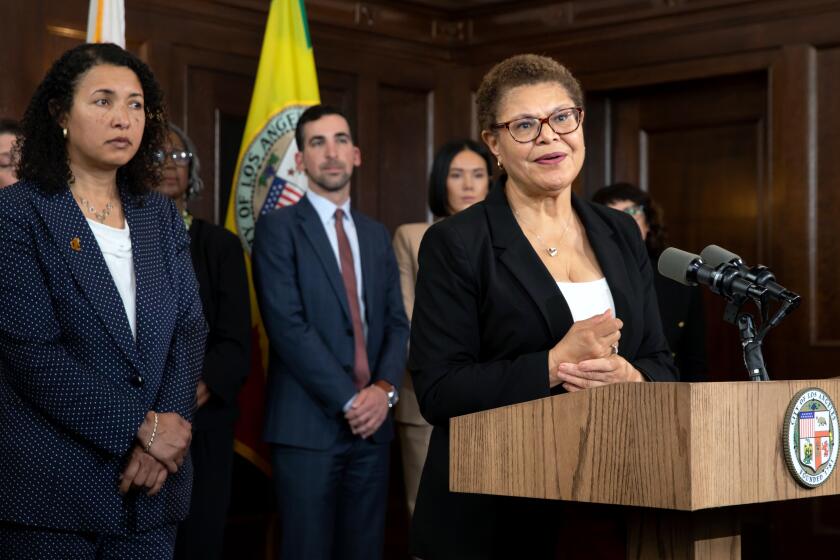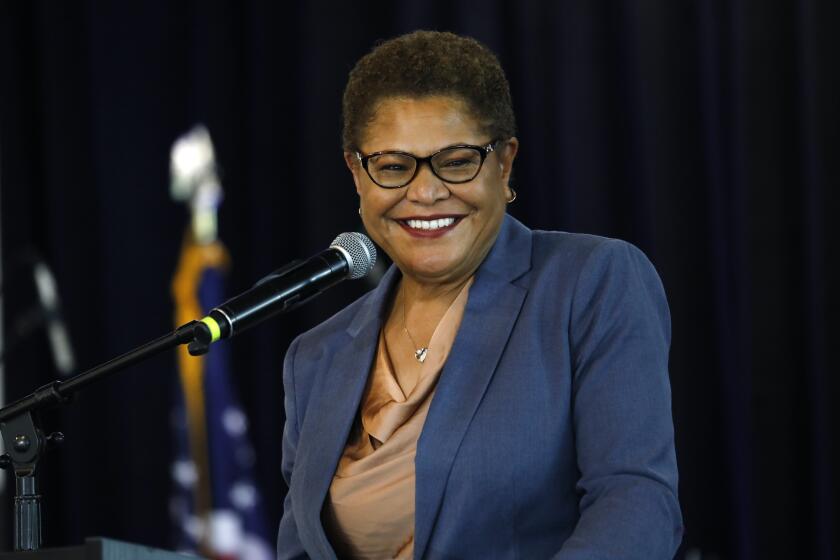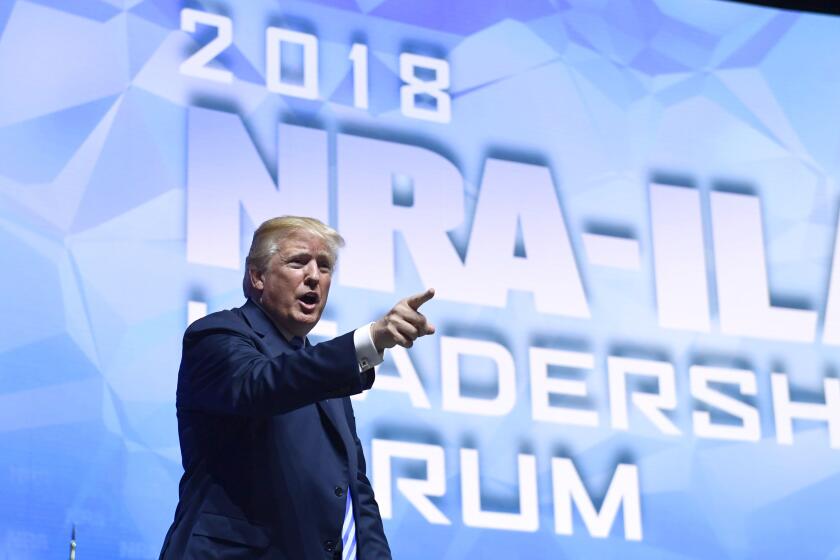Column: If not cops or guns, what will it take to make us feel safe? L.A. has a new answer
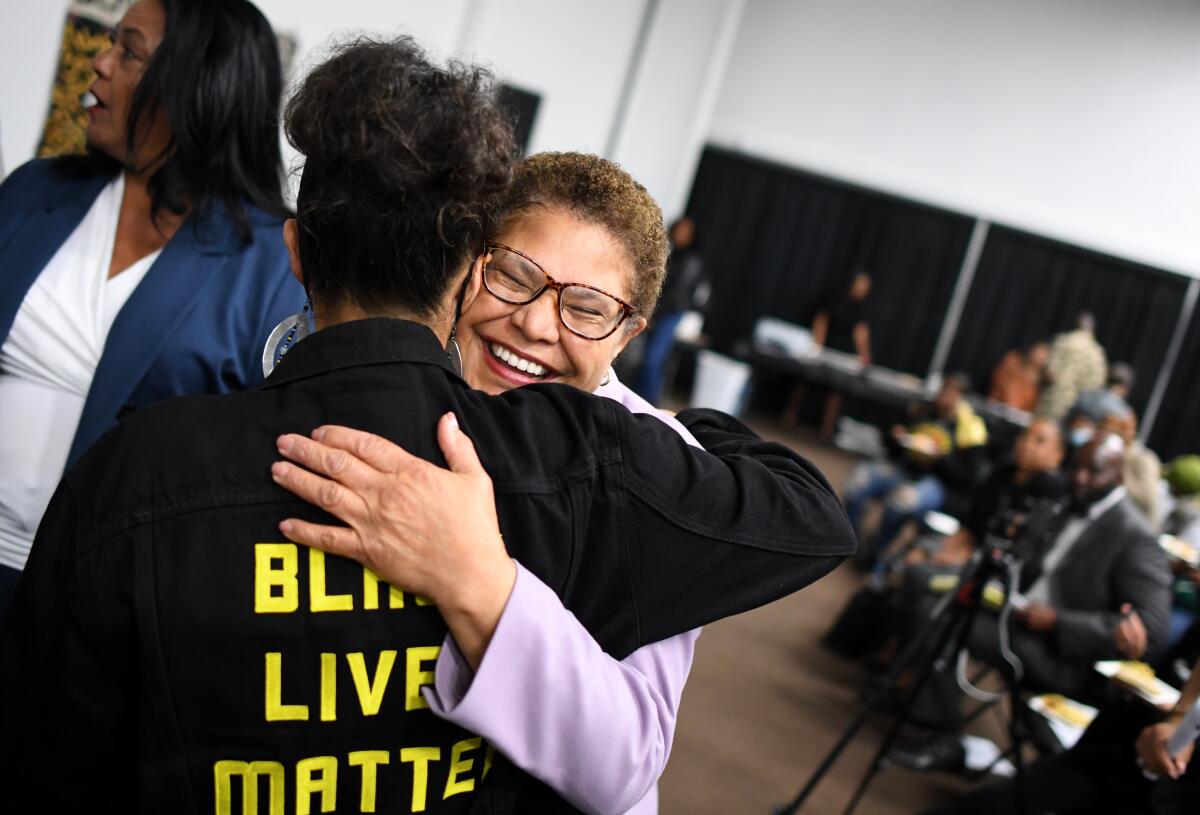
- Share via
Not long ago, the nonpartisan Public Policy Institute of California released a pair of polls showing that most adults in this state believe violence is a problem in their neighborhoods and are afraid they or their loved ones will become the victim of a crime.
At the same time, fewer than half of adults say that police are doing an excellent or even a good job fighting crime and violence. No doubt, some blame the declining staffing levels at police departments, but others point to racial profiling.
None of this is particularly surprising, of course. What the polls found is entirely consistent with the obtusely binary debate over public safety, both locally and nationally.
The mayor’s spending plan for the coming year includes a key strategy for rebuilding the LAPD: persuading 200 recently retired officers to come back.
There are those who want more police on the streets and those who don’t. Those who feel violent crime is on an unprecedented rise and those armed with historical data who argue that it’s not. And I won’t even talk about guns — at least not yet.
With so many people so polarized, I’ve long thought we’ve stopped making progress. Then, one evening last week, l saw something in Leimert Park that made me think again.
::
“When we say ‘defund the police,’ we mean divest from failed social policies. Divest from systems that harm so that we might invest in systems of care.”
Melina Abdullah, the co-founder of Black Lives Matter-L.A., was pacing the cavernous main room of the newly opened Center for Black Power, microphone in hand, her voice rising and falling with every step.
She along with dozens of members of other activist groups had gathered in Leimert Park to present their annual People’s Budget — a community-led counterproposal to the official $13.1-billion budget plan drawn up by Mayor Karen Bass and under consideration by the Los Angeles City Council.
Based on a survey of residents mostly from South L.A., the People’s Budget is chock full of progressive priorities, though its overarching premise is to “reimagine public safety” by redirecting billions of dollars from police to social services and amenities for long-neglected communities of color.
“We believe in transforming the world so we can build new systems that actually keep Black people safe,” Abdullah explained.
Unlike Eric Garcetti, who as mayor generally tried to avoid activists (especially after they started protesting outside Getty House and regularly antagonizing members of the City Council), Bass accepted Abdullah’s invitation to join them at the Center for Black Power.
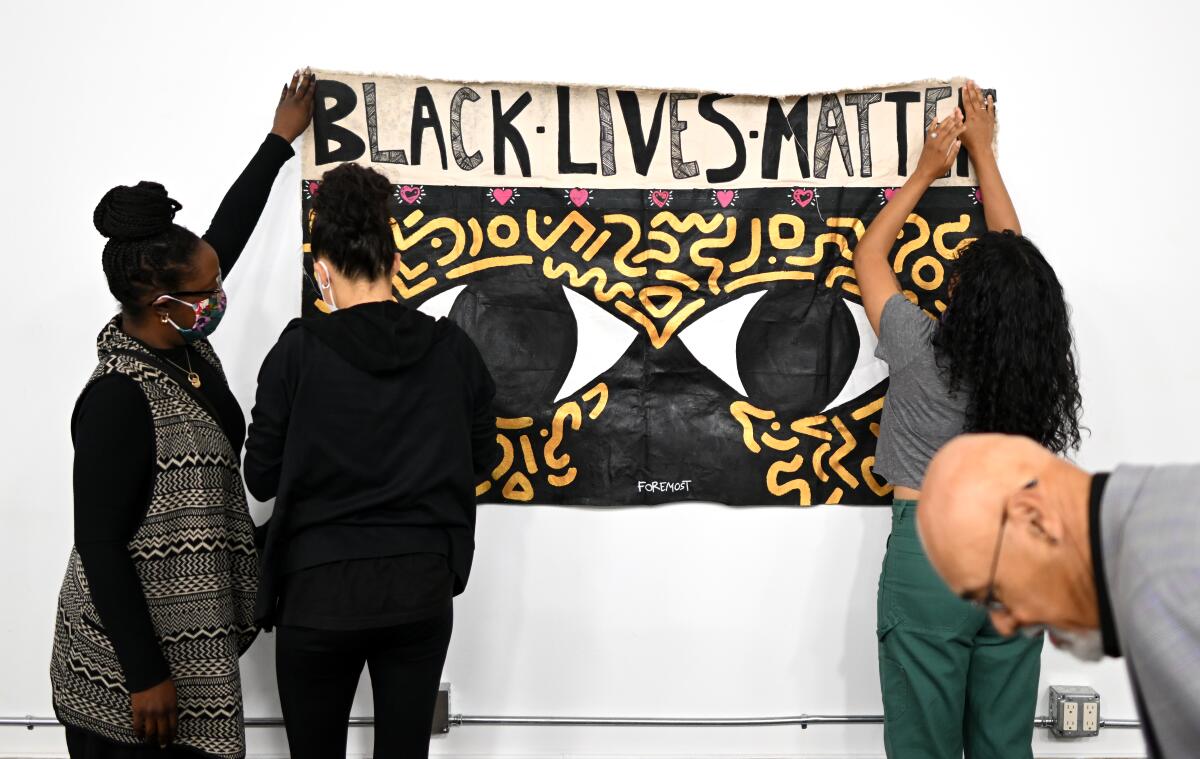
Sure, she has known many of these activists for decades, so long that when she arrived, the scene was something like a family reunion, with hugging, laughing and the sharing of old stories.
“I’m happy to be here,” Bass said. “I’ve always come to the community because this is my community.”
Still, it speaks volumes about overcoming polarization that she actually showed up to sit in the front row and stare at a slideshow about defunding the police — a slogan that Abdullah helped popularize and Bass once called “one of the worst ... ever.”
Indeed, back during the campaign, few things seemed to irritate the then-congresswoman more than having to repeatedly deny she had plans to “defund” the Los Angeles Police Department. “How many times am I going to get asked that?” she once snapped when I brought it up.
Fast-forward a few months, and her budget proposal pushes to give the LAPD, which already has a large chunk of the our tax dollars, another $87 million to hire 400 officers to restore the department’s ranks to 9,500.
“I know that that is ambitious, but I think it needs to happen,” she told The Times last month.
After Abdullah, a few more speakers got up to make the case for why that doesn’t need to happen, Bass finally got a chance to have her say.
First, she acknowledged that public safety requires a comprehensive response. “You have to address the root causes,” she said. “You have to address the health and social, the economic issues that lead to our problems.”
Mayor Karen Bass said her proposed budget, which will be released Tuesday, will seek to restore the LAPD to 9,500 officers — an extremely tall order during a staff shortage.
But she didn’t back down from her plan to fund more police, noting that many residents outside South L.A. — from neighborhoods that are objectively safer than many of the neighborhoods in South L.A. — have told her they want more officers.
“I have to be mayor for the entire city,” Bass said as she has so many times before. “And I know what the sentiment is in this room. But it doesn’t represent the sentiment in the entire city.”
Just when many in the room seemed disappointed, ready to stop listening and return to their previously polarized state, the mayor said this: “We are going to invest in reimagining public safety through the Office of Community Safety.”
Out came the smartphones to record video as she introduced Karren Lane, deputy mayor for the newly created office.
Although it hasn’t gotten much attention with all the back-and-forth over funding the LAPD, Bass has described the office as key to the city’s efforts “to break the cycle of violence and crime.” In fact, it embodies much of what’s in the People’s Budget, prioritizing investment over punishment.
Lane explained more of her aspirations when I caught up with her a few days later.
In the short-term, the office is working with nonprofits to oversee the city’s gang intervention and anti-violence programs, as well as manage the expansion of unarmed teams that respond to emergency calls. But in the long-term, she expects there also will be economic opportunities and other resources.
“The vision is for the office to be the infrastructure for a comprehensive approach to safety,” Lane told me. “We are kind of pulling from what is existing in the city, but our goal is to actually build out a system.”
That means moving beyond scattered criminal justice reform programs toward “institutionalizing” the mindset at City Hall. In other words, she wants the Office of Community Safety to be just as important and just as well funded as the law enforcement-focused Office of Public Safety.
“There’s a national discourse about safety,” Lane said. “And L.A. is in a position to really model what it can look like to have significant investment in community-led safety solutions and having a comprehensive approach to safety.”
::
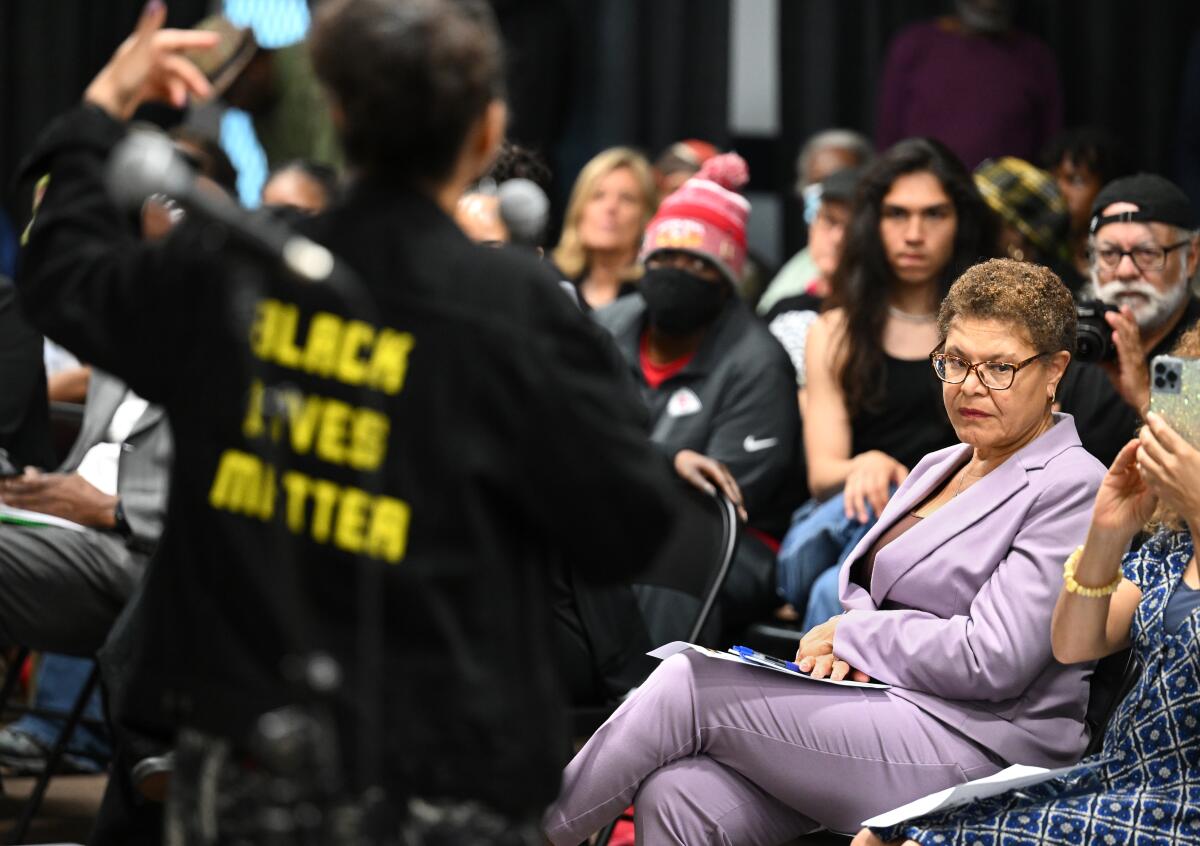
Ultimately, both the local and the national debate over public safety comes down to just that: What will it take for the public to feel safe? (Emphasis on the word “feel” because the data on crime don’t always track.)
Too often, when Americans feel unsafe and afraid, we reflexively demand more police and, increasingly, we buy guns for self-defense. We do this because it’s what we’ve always done.
That’s why I don’t doubt Bass or Lane when they tell me that, despite the survey that led to the People’s Budget, some Black and Latino residents in South L.A. want more officers in their neighborhoods, too.
An activist acknowledged as much at the Center for Black Power, saying: “One of the things that has happened with history is that we have conflated policing with safety, when policing has historically been used as a tool of violence and control.”
I agree. But activists have clearly had less — or at least uneven — success in getting the broader public to agree.
More police are in demand. So what’s needed is an alternative to public safety. Not a collection of reform-centric programs or reams of data on actual crime rates, but a strategy to help people feel safe. One that can be replicated in other cities and maybe used to push back on Republican politicians fear-mongering about crime.
Based on polls, one would think backing laws that permit more guns would be a losing idea politically. But Americans are already armed to the teeth.
Part of the reason so many Americans feel unsafe and afraid is because so many more Americans now own guns.
Studies show that violent crime is nowhere near the levels of the 1990s and that more guns merely equal more death. But as I wrote recently, that hasn’t stopped people from feeling they must buy and carry a gun for self-defense.
We’re unlikely to see a significant drop in gun violence — and fear — until there are fewer guns in circulation in America. And we’re never going to see a significant drop in the number of guns in circulation until Americans feel safe without them.
The Office of Community Safety could be a proof of concept on how to do just that. How to move beyond the polarization to achieve true public safety.
Lane doesn’t necessarily see her office as an alternative to investing so heavily in law enforcement. But I do — especially if it’s given more funding than the LAPD. That’s what I would call progress.
More to Read
Sign up for Essential California
The most important California stories and recommendations in your inbox every morning.
You may occasionally receive promotional content from the Los Angeles Times.
